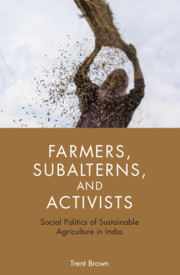Book contents
- Frontmatter
- Dedication
- Contents
- List of Images
- Acknowledgements
- 1 Introduction
- 2 India's Agrarian Crisis: A Gramscian View
- 3 Embedded in Power: Potentials and Constraints of Sustainable Agriculture
- 4 The Kheti Virasat Mission: People's Movement or Agrarian Populism?
- 5 The Tamil Nadu Organic Farmers’ Movement: The Limits of Participatory Approaches
- 6 The Beej Bachao Andolan: How ‘Grassroots’ is the Grassroots?
- 7 Conclusion
- Bibliography
- Index
5 - The Tamil Nadu Organic Farmers’ Movement: The Limits of Participatory Approaches
Published online by Cambridge University Press: 08 July 2018
- Frontmatter
- Dedication
- Contents
- List of Images
- Acknowledgements
- 1 Introduction
- 2 India's Agrarian Crisis: A Gramscian View
- 3 Embedded in Power: Potentials and Constraints of Sustainable Agriculture
- 4 The Kheti Virasat Mission: People's Movement or Agrarian Populism?
- 5 The Tamil Nadu Organic Farmers’ Movement: The Limits of Participatory Approaches
- 6 The Beej Bachao Andolan: How ‘Grassroots’ is the Grassroots?
- 7 Conclusion
- Bibliography
- Index
Summary
I was back in green, sunny Tamil Nadu, after a five-year absence, travelling down bumpy roads to a small village outside of the town of Nagapattinam. Agriculture in this village had been badly damaged by the South Asian Tsunami of 2004. I was there to interview members of a grassroots informal collective of around ten to twenty people that had formed in the aftermath of the tsunami at the instigation of Revathi, head of an NGO known as the Tamil Nadu Organic Farmers’ Movement (TOFarM). The group formed, in the first instance, to restore tsunami-affected lands but had continued after restoration efforts were complete to provide support mechanisms for people wishing to develop livelihoods through chemical-free, ecological farming. I was accompanied by my translator, Mr. Arockiasamy, and Mathew, who was serving as an unpaid mentor figure within the local collective, providing knowledge and support for others wishing to develop sustainable rural livelihoods.
In the morning, Mathew took us to the large, opulent house of Mudaliyar. As a high-caste, large land-holding farmer, Mudaliyar was part of the traditional elite in a region whose rural society is marked by deep inequalities. Converting a portion of his land to organic cultivation had brought Mudaliyar some benefits. He and many other farmers had been sceptical of the benefits of chemical use for years—yet, until Revathi's intervention, no one had showed them a viable alternative. We sat in the sun on his front porch and heard him speak with great enthusiasm about his success with ecological farming and how the local collective was supporting others as they transition away from chemicals and build sustainable livelihoods. This was what TOFarM was supposed to be about—an initiative, though sparked by an NGO worker, had taken on a life of its own within the community: a self-supporting ‘movement’ for change.
While we were talking, Lalita arrived. She sat silently with legs crossed at the base of the stairs below the porch and waited.
- Type
- Chapter
- Information
- Farmers, Subalterns, and ActivistsSocial Politics of Sustainable Agriculture in India, pp. 114 - 138Publisher: Cambridge University PressPrint publication year: 2018



